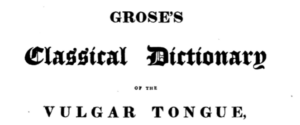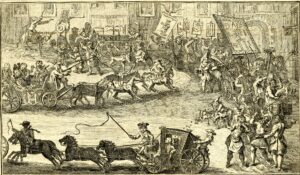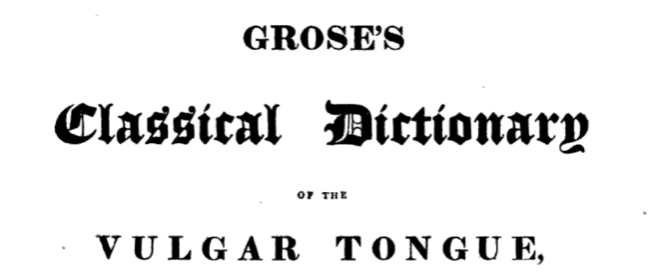Dictionary of the Vulgar Tongue – Day 299, 300 and 301

Scald Miserables
Grose’s dictionary refers to this as “a set of mock masons, who in 1744 made a ludicrous procession in ridicule of the Freemasons”.

As this print from 1742 shows, this procession had been going on for a few years and it took place just outside of the boundaries of the City of London. I can’t imagine that the Freemasons were much impressed by this little show, but there were many even at this time who treated the organisation with some disrespect.
Schism Shop
On the subject of disrespect, those involved with the dissenting religions in the eighteenth century were often vilified by those who couldn’t believe anyone couldn’t accept everything that the Church of England said was true. The dictionary definition of this is “a dissenting meeting house”, whether that be Quakers, Baptists, Congregationalists or Unitarians, to name just a few. There’s something quite charming though in the abusive term, I like to think that some of the groups would have adopted it almost as a badge of pride. Looking at newspaper archives, the dictionary was ahead of its time, as the term was relatively rare at the end of the eighteenth century, but it became much more commonly used towards the end of the nineteenth century before it died out during the early twentieth century.
Scourers
There’s a myth that there used to be a lot more respect for the law in centuries gone by, but there were plenty of robberies in churches in the nineteenth century and no shortage of anti-social behaviour in the eighteenth and nineteenth centuries. That is also evident from this dictionary definition, namely “Riotous bucks, who amuse themselves with breaking windows, beating the watch, and assaulting every person they meet: called scouring the streets”. Crime as a whole was also high in the eighteenth century, partly through increased poverty but also through a greater opportunity given the newly wealthy classes. Much as I like city living, I think the rural life was probably safer and more peaceful back in the late eighteenth century when Grose wrote his book.


